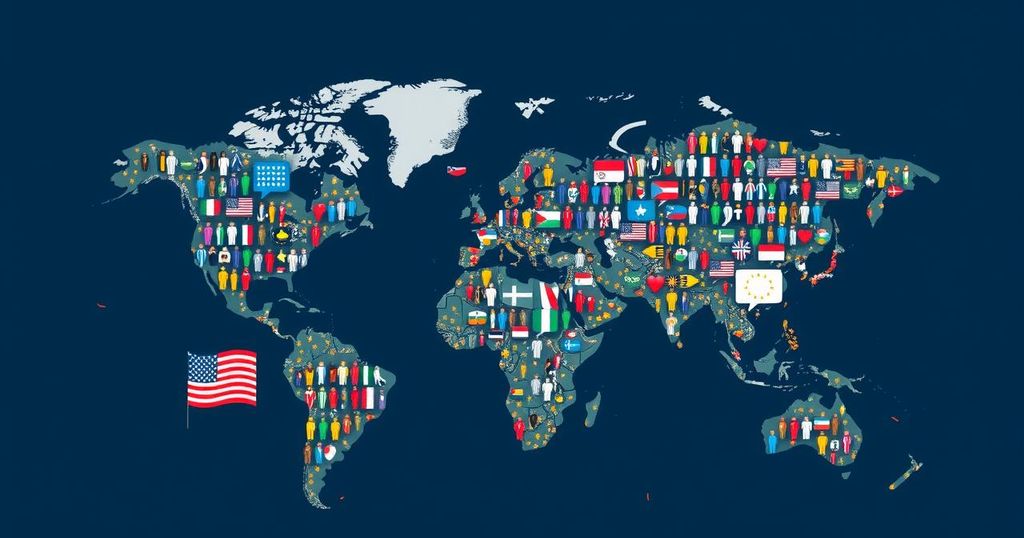The Starr Forum at MIT delved into global perspectives on the 2024 U.S. presidential election, highlighting shifting perceptions of American democracy from Latin American, Indian, African, and European viewpoints. Experts noted a decline in global investment in the election’s outcome, as nations grapple with their internal political dynamics. Key discussions reflected on right-wing extremism, democratic erosion, and the impact of U.S. policies on foreign relations.
The 2024 United States presidential election is poised to have significant repercussions on a global scale, reflecting varied perspectives from international citizens and leaders. This topic was explored in depth during the recent Starr Forum titled “The 2024 US Presidential Election: The World is Watching,” hosted by the Center for International Studies at the Massachusetts Institute of Technology. Moderated by Evan Lieberman, the forum brought together experts specializing in political dynamics from Africa, Asia, Europe, and Latin America. They provided insights into how electoral outcomes are perceived within the contexts of diverse governance styles, public attitudes towards American democratic values, and the overarching influence of the United States on these regions. Katrina Burgess, a political economy professor at Tufts University, highlighted a shift in how members of the Latin American diaspora view American democracy, stating, “American democracy is no longer perceived as a standard bearer.” This sentiment arises from their complex relationship with U.S. policies on economic issues, immigration, and energy, revealing a nuanced landscape of political identities. Prerna Singh from Brown University examined India’s evolving political climate, noting, “Indian leaders don’t confer with the press. Indian leaders don’t debate like Americans,” thereby underscoring a departure from traditional democratic practices. Singh articulated concerns regarding the rise of exclusionary nationalism in India, which threatens to undermine democratic tenets. John Githongo, a fellow at MIT, expressed discontent regarding the perception of America in Africa, lamenting that “America’s soft power infrastructure in Africa is crumbling,” as countries increasingly lean towards partnerships with China. He noted how youth protests in Kenya reflect a broader dissatisfaction with unfulfilled democratic promises. Daniel Ziblatt from Harvard University compared the rise of right-wing extremism in Europe with trends in the United States, emphasizing that “we see the rise of the radical, antidemocratic right in Europe and it looks like shifts we’ve observed in the U.S.” He noted that ongoing geopolitical crises, such as Russia’s actions in Ukraine, further complicate transatlantic relations. As the forum progressed, a significant theme emerged: the global investment in the outcomes of the U.S. elections appears to be waning compared to previous election cycles. Panelists agreed that varied regions are focusing more on their domestic issues rather than American politics. In conclusion, while the implications of the 2024 U.S. presidential election remain significant, the global perception is shaped by a complex interplay of regional challenges and political identities. As nations confront their own democratic dilemmas, the outcomes in the U.S. may resonate differently than in past years, highlighting the necessity for nuanced understanding in the international community concerning American politics.
The backdrop of the article centers on the influence of the 2024 U.S. presidential election in a global context. As the election nears, international leaders and citizens monitor how the outcomes may affect relations, policies, and perceptions of democracy within their own countries. The forum discussed the impacts of U.S. domestic politics on international dynamics and the evolving views of America in various regions, making it an essential consideration for a comprehensive understanding of the 2024 election’s global significance.
In summary, the 2024 U.S. presidential election is drawing varied global reactions, with experts emphasizing diminished investment in its outcome as countries focus on pressing local issues. The discussions highlighted key political shifts and regional perspectives, revealing a complex landscape where U.S. policies and political trends interact with the challenges faced by other democracies around the world.
Original Source: news.mit.edu







